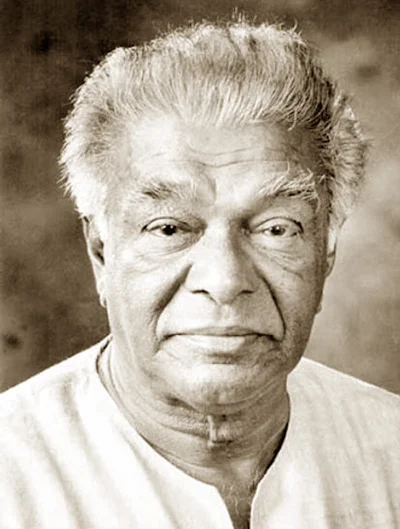Midweek Review
How Yahapalana project diminished SLFP, caused current impasse
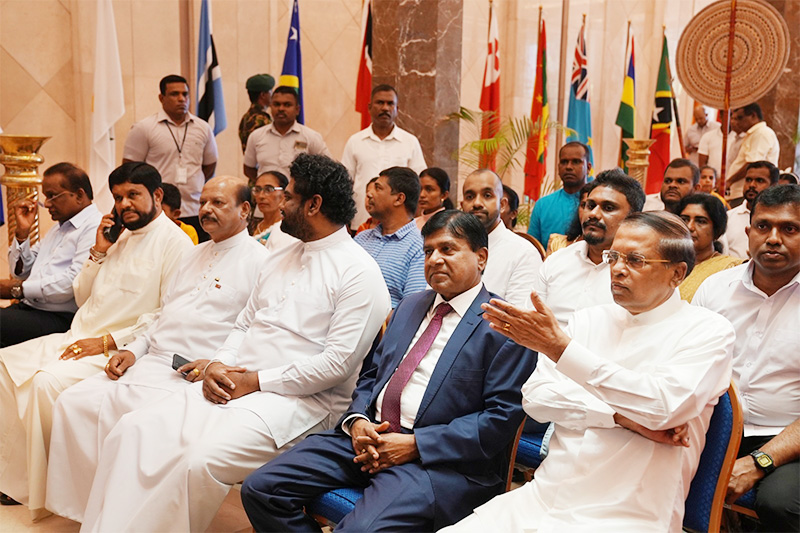
President Maithripala Sirisena dissolved Parliament in late June 2015 to save his Yahapalana partner UNP from the COPE (Committee of Public Enterprises) probe report on the first Treasury bond scam.
Having directed the then UPFA General Secretary Mahinda Amaraweera to lodge a complaint at the Commission to Investigate Allegations of Bribery or Corruption (CIABOC) soon after the media exposed the scam, President Sirisena quietly dissolved Parliament on the night of June 26, 2015, and called a General Election on August 17, 2015.
The then COPE Chief DEW Gunasekera is on record as having alleged that Sirisena dissolved Parliament to thwart him presenting the report on their findings. The Yahapalana leadership probably felt that had that happened it could have caused immense damage to the UNP campaign.
The obstruction caused by Sirisena, in late June 2015, and then declaration against the UPFA prime ministerial candidate in August 2015, exposed the SLFP leader. Sirisena plainly promoted the UNP at the expense of his own political party and those who accepted Cabinet portfolios and various other perks and privileges in terms of Sirisena’s agreement with the UNP cannot under any circumstances absolve themselves of the responsibility for the current crises. In addition, there were several SLFP State Ministers in the Yahapalana administration. The ruination of both the SLFP and the UNP was caused by Yahapalana policies and strategies. Perhaps, those interested in the issue at hand should undertake examination of facts and events leading to the destruction of two major political parties.
But can the Yahapalana lot explain to the country not just what they did with money obtained from two massive Central Bank bond scams, but what they did with USD 12.5 billion they borrowed at high interest from the international bond market and the one billion USD they got for the brand new Hambantota Harbour by renting it out to China on a 99-year lease. And how much did our comrades, who were hand in glove with that regime get for their share of theatrics?
By Shamindra Ferdinando
Maithripala Sirisena, in his capacity as the Yahapalana President and leader of the SLFP, resorted to an utterly irresponsible course of action in 2015.
Having won the 2015 presidential election, with the support of a UNP-led coalition that included the TNA and the JVP, the one-time SLFP General Secretary had no option but to fully cooperate with the UNP. President Sirisena bent over backwards to appease the members of the Coalition that ensured his victory. The TNA that once recognized the LTTE as the sole representative of the Tamil speaking people, delivered all Northern and Eastern electorates to Sirisena, on a platter.
The developing crisis in the SLFP, in the run-up to the presidential election later this year, cannot be examined without taking into consideration Sirisena’s unscrupulous actions during the Yahapalana administration before relations between the President and the UNP deteriorated, especially after the heavy setbacks the Yahapalana partners suffered at the Local Government polls in February 2018. By then, their relations had suffered irreparable damage and Sirisena was exploring ways and means of bringing Premier Ranil Wickremesinghe down to his knees.
At the time Sirisena switched his allegiance to Wickremesinghe, in late 2014, the then SLFP-led UPFA enjoyed a near 2/3 majority in Parliament, having won 144 seats, an increase of 39 seats at the April 2010 General Election since the previous parliamentary poll conducted in 2004. Today, under Sirisena’s faltering leadership, the SLFP parliamentary group consists of just 14 MPs. Of them, 12 had been elected on the SLPP ticket. with one appointed on the SLPP National List (Dr. Suren Raghavan) and only one elected on the SLFP ticket (Jaffna district lawmaker Angajan Ramanathan).
Sirisena, fighting on multiple fronts, has the backing of only one MP. Kegalle District MP Sarathi Dihsmantha Mithrapala seems to be the only lawmaker so far confident of Sirisena regaining control of the party against the backdrop of twice President Chandrika Bandaranaike Kumaratunga moving Court against the shackled SLFP leader. Sirisena’s move to bring in Justice Minister Dr. Wijeyadasa Rajapakshe, PC, too, has backfired with the contentious SLFP leadership row now beyond the hands of the various SLFP factions.
Former President Sirisena’s recent claims, regarding Indian involvement in the 2019 Easter Sunday carnage, has given a new dimension to the post-war developments here.
Having accused the Nimal Siripala-Mahinda Amaraweera led group, backed by Mrs. Kumaratunga of trying to align the SLFP with President Wickremesinghe’s UNP, Sirisena has surprised all by reaching a consensus with Justice Minister Dr. Rajapakshe on the post of Acting Chairman of the party. Sirisena had Dr. Rajapakshe elected in response to Mrs. Kumaratunga’s group naming Nimal Siripala de Silva as the Acting Chairman. Both Acting Chairmen, Nimal Siripala de Silva and Dr. Rajapakshe are members of Wickremesinghe’s Cabinet and the move on the part of SLFP factions to elect outsiders as Acting Chairmen seemed absurd.
Sajin Vass Gunawardena, who once wielded immense political clout as monitoring MP of the Foreign Affairs Ministry, during President Mahinda Rajapaksa’s second term, is now with Sirisena’s faction. The other post-war monitoring MP, the Rajapaksas appointed, was Duminda Silva, a former UNPer.
Bombshell declaration
Sirisena’s faction has repeatedly accused Mrs. Kumaratunga’s group of facilitating President Wickremesinghe’s political strategy.
Let us examine how Sirisena cooperated with the UNP, having betrayed the party in the run-up to the 2015 presidential poll. It would be pertinent to mention that Sirisena contested on the ‘Swan’ symbol of the New Democratic Front (NDF). Founded in 1995, it was originally called Democratic United National Lalith Front but renamed NDF in 2009. Since then, the then General Sarath Fonseka (2010), Maithripala Sirisena (2015) and Sajith Premadasa (2019) contested under that symbol and the possibility of incumbent President Ranil Wickremesinghe, too, choosing that party to contest forthcoming presidential poll cannot be ruled out.
A few days before the General Election, on August 17, 2015, President Sirisena’s office leaked a highly controversial letter. Therein, Sirisena, in his capacity as the SLFP leader, disclosed several issues he took up with the UPFA prime ministerial candidate Mahinda Rajapaksa.
The five-page letter emphasized whatever the outcome of the election, UPFA’s prime ministerial candidate Mahinda Rajapaksa wouldn’t be appointed Premier under any circumstances, even if that party won the General Election. There hadn’t been a similar warning issued by a President here or perhaps anywhere else that their own prime ministerial candidate wouldn’t be considered for the post. That statement was meant to discourage the UPFA block vote thereby giving a clear advantage to the UNP. That betrayal caused a debilitating setback. That was Sirisena’s intention. In other words, the SLFP leader wanted the UNP to win the election at the expense of his own party. But, Mrs. Kumaratunga and her associates wouldn’t dare take up that issue as at that time all of them cooperated with the UNP to defeat the Rajapaksas. That is the ugly truth.
Sirisena’s letter to Mahinda Rajapaksa, issued to the media on Aug 13, 2017, dealt with several issues and was written with the sole purpose of releasing it to the media, just ahead of the General Election. Inquiries made by the writer at that time, revealed that Mahinda Rajapaksa’s camp decided against releasing it to avoid any unfavourable fallout.
Having warned Mahinda Rajapaksa not to expect the premiership, Sirisena proposed that in case the party won the election, the party could pick a premier from among Nimal Siripala de Silva, John Seneviratne, Chamal Rajapaksa, Athauda Seneviratne, A.H.M. Fowzie, Susil Premjayantha and Anura Priyadarshana Yapa.
Sirisena urged Rajapaksa to publicly display his magnanimity to pave the way for the appointment of a new Premier. Sirisena claimed that he was able to help the SLFP retain the presidency by giving leadership to the growing Opposition movement against Mahinda Rajapaksa due to his (Sirisena’s) qualities and the faith the electorate had in the SLFP.
Sirisena also claimed that he averted a huge electoral rout by not calling parliamentary polls immediately after his triumph at the January 8, 2015, presidential poll. Sirisena found fault with Rajapaksa for contesting from the Kurunegala district, regardless of his (Sirisena’s) specific request not to contest as it would deprive the SLFP of the support of the Tamil speaking people, civil society and the middle class.
Interestingly, on the day Sirisena leaked his letter to Mahinda Rajapaksa, Premier Wickremesinghe addressed the media at the Sri Lanka Foundation where he explained how victory for the UNP-led National Front for Good Governance (UNFGG) could help consolidate the gains made at the presidential election. Premier Wickremesinghe reiterated his unwavering commitment to the continuation of the post-presidential polls arrangement with Sirisena.
In line with his overall strategy, immediately after the conclusion of the General Election, Sirisena unceremoniously removed 25 members of the SLFP Central Committee. At the behest of Sirisena, Colombo District UPFA candidate Prasanna Solangaarachchi secured an enjoining order from the Colombo District Court to prevent the convening of the decision-making CC. That move was meant to prevent convening of that body until the conclusion of the General Election. Subsequently, Duminda Dissanayake (now a key member of the Kumaratunga-led group) in his capacity as the Acting General Secretary of the SLFP, removed CC members as directed by Sirisena.
Regardless of Sirisena’s betrayal, the UNFGG couldn’t secure a simple majority. They obtained 106 seats, including 13 National List slots whereas the UPFA won 95 seats. The UPFA parliamentary group included 12 National List slots. In terms of the agreement between Sirisena and the UNP, the former offered the required support to form a government, thereby sharing the Cabinet portfolios. Sirisena’s despicable move divided the UPFA in Parliament.
Sirisena went a step further. The Yahapalana President and Premier offered the position of Leader of the Opposition to R. Sampanthan, the leader of the TNA, though it won only 16 seats, including two National List slots at the General Election.
Had Sirisena remained neutral, the outcome at the 2015 General Election could have been either different or extremely narrow. Sirisena also denied National List slots to those who had been supportive of Mahinda Rajapaksa and openly questioned the President’s declaration that he wouldn’t be considered for Premier, under any circumstances. Sirisena packed the UPFA National List with those who had been rejected by the people as he sought to consolidate his position, regardless of consequences.
SLFP-UNP pact
Both Sirisena and Wickremesinghe agreed that tangible measures were required to thwart any attempts by the Rajapaksas to stage a comeback. Sirisena appeared to have agreed that the Treasury bond scam, perpetrated in late February 2015, just a couple of weeks after his swearing in ceremony, shouldn’t undermine a far reaching agreement between the SLFP, the main constituent of the UPFA and the UNP. SLFP Duminda Dissanayake and UNP General Secretary Kabir Hashim (KH quit UNP in early 2020 and was elected on the SJB ticket at the last General Election) signed ten agreement on behalf of their respective parties at a ceremony held at the Presidential Secretariat on August 21, 2015. The agreement basically dealt with nine major issues and was in operation for a period of two years. Dissanayake and Hashim inked the agreement immediately after Wickremesinghe was sworn in as the Premier before Sirisena.
About eight months after the signing of the agreement, the powers that be perpetrated the second Treasury bond scam. Between the signing of the agreement (Aug 2015) and the second treasury bond scam (March 2016), the Yahapalana government betrayed the war-winning armed forces at the Geneva-based United Nations Human Rights Commission. That was unparalleled treachery and till now Sri Lanka has failed to take tangible measures to set the record straight.
The Aug 2015 agreement failed to have the desired results. In fact, the flawed Sirisena-Wickremesinghe strategy caused rapid deterioration of both political parties during the Yahapalana administration. Wickremesinghe’s efforts to retain the leadership finally led his Deputy Sajith Premadasa to split and contest the last General Election under the SJB ticket. The UNP that secured 106 seats at the August 2015 General Election was reduced to just one National List slot whereas Sajith Premadasa’s SJB obtained 54 seats, including seven National List slots. The UPFA didn’t even contest the last General Election as in its place emerged the SLPP (Pohottuwa party) that handsomely won the General Election but an explosive mixture of developments and external interventions caused its collapse, paving the way for Wickremesinghe to return to power under most unusual circumstances.
Ousted President Gotabaya Rajapaksa in ‘Conspiracy to oust me from the presidency’ ascertained that in the wake of the violent protest campaign, dubbed ‘Aragalaya,’ then Prime Minister Ranil Wickremesinghe was the only person capable of restoring the rule of law in the country.
In the chapter, titled ‘The Politics of Regime Change,’ in the recently launched memoirs that dealt with the circumstances leading to his ouster in July, 2022, Gotabaya Rajapaksa recognized the UNP leader as the ideal person to overcome, what he called, mob rule.
Developing crisis
The SLFP is in such turmoil, the belittled leadership is not in a position at least to organize a proper May Day rally today. Obviously, Sirisena may have not anticipated the Colombo District Court issuing injunctions against parachuted Acting Chairman Wijeyadasa Rajapakshe, while he continues to be Justice Minister in the present government after being elected on the SLPP ticket, and Acting General Secretary Sarathi Dushmantha.
The injunctions, effective until May 8, were issued after considering a case filed by Ministers Lasantha Alagiyawanna and Mahinda Amaraweera and MP Duminda Dissanayake.
On behalf of the plaintiffs, President’s Counsel Chandaka Jayasundara presented the facts to Court and stated that it is illegal and unconstitutional for the defendants to hold those positions.
The Court was told that Wijeyadasa Rajapakshe couldn’t hold the post of Acting Chairman as he was not a member of the SLFP and it is constitutionally illegal for a member of another party to hold a position in the SLFP.
In respect of Sirisena, courts have issued two orders preventing him from functioning as the Chairman of the party in violation of SLFP Constitution whereas Sirisena has moved Court against Minister Mahinda Amaraweera alleging that the Minister defamed him. Sirisena has demanded a staggering Rs 1 bn from one of his former associates. Responding to media queries, a cheeky Amaraweera has warned Sirisena of further disclosures. Sirisena seems to be in a bind literally facing nightmare after nightmare of his own making due to unbelievable acts of treachery he has perpetrated boomeranging on him. The beleaguered suspended SLFP leader is faced with a set of problems for which there seems to be no solution. Even if the courts, in respect of ongoing cases finally decided in his favour, the SLFP has suffered such devastating damage a full and quick recovery seems unrealistic.
The SLFP is in a true dilemma as to its future. With the Election Commission, in terms of the Constitution, empowered to make official announcements on presidential elections on or after July 17, the once formidable political party that had secured President’s Office on several occasions is not sure how to reach consensus on the presidential and parliamentary polls. Of the current parliamentary group, nearly a dozen seem to be with President Wickremesinghe, Dayasiri Jayasekera on his own and Sarathi Dushmantha Mithrapala declaring his support for Sirisena who is very much unlikely to get an opportunity to re-contest Polonnaruwa on the SLPP ticket again.
Midweek Review
How Prof. Dewasiri’s FB post brought about Speaker Ranwala’s exit
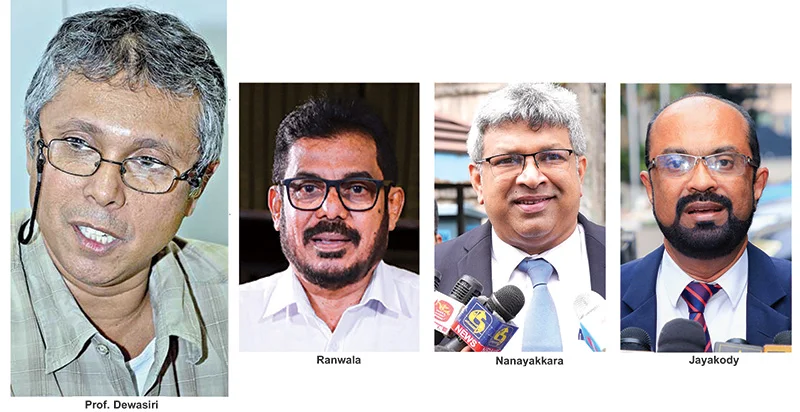
By Shamindra Ferdinando
Prof. Nirmal Ranjith Dewasiri was the first to question the National People’s Power government over Speaker ‘Dr.’ Asoka Sapumal Ranwala regarding his academic qualifications.
Dewasiri’s shock query caught the NPP by surprise. The academic questioned the government on his social media account on 05 Dec. The Parliament unanimously appointed Ranwala as Speaker of the Tenth Parliament on 21 Nov.
Dewasiri demanded that the government compel Speaker Ranwala to resign in case the parliamentarian deliberately provided false information. If the Speaker declined to do so, appropriate measures should be taken to remove him, Prof. Dewasiri declared, while finding fault with the new entrant for (i) falsely claiming to have a degree and (ii) believe he could hold such an important position regardless of the deceit perpetrated by him.
Prof. Dewasiri emphasized that the second fault was far worse than the first. One-time spokesperson for the Federation of University Teachers Association (FUTA) and advocate of the Yahapalana administration warned the government of far reaching consequences as it was badly exposed.
The government obviously didn’t take Prof. Dewasiri’s social media post seriously. Perhaps the top leadership felt that the issue at hand wouldn’t attract much public attention. However, the Opposition, both in Parliament and outside, launched an all-out attack.
The SJB declared its intention to move a no-confidence motion against the Speaker. In spite of the NPP having an unprecedented 2/3 majority in Parliament, the ruling party feared to face the Opposition move. The NPP could have easily routed the combined Opposition in Parliament, but to defend an obvious wrongdoer would have ruined President Anura Kumara Dissanayake’s (AKD) parliamentary group as they came to power, less than three months ago, promising to correct all the shenanigans that had been going on in the country, under the guise of democracy, since independence.
Beleaguered AKD had no option but to ask Speaker Ranwala to step down. The NPP could have avoided a lot of flak if the party acted immediately after Prof. Dewasiri’s disclosure. If not for the intervention made by the academic and a vociferous critic of wrongs done by the previous regimes, particularly to academics, Ranwala would still have been the Speaker.
The utterly dispirited SJB wouldn’t have inquired into Ranwala’s credentials under any circumstances. Thanks to Prof. Dewasiri, the Opposition received a mega opportunity to question the very basis of the NPP’s presidential and parliamentary election campaigns.
The SJB and new Democratic Front (NDF) had been rejected by the electorate to such an extent, even if they challenged Ranwala over his educational qualifications, the people may have ignored the issue as the rantings of a frustrated Opposition still licking the wounds of their routing at the polls. Prof. Dewasiri’s disclosure obviously delivered a knockout blow to the government.
Ranwala resigned on 13 Dec., just over a week after Prof. Dewasiri’s bombshell revelation. It would be pertinent to mention that just before the announcemnt of the Speaker’s resignation, President AKD told government media bosses that he wouldn’t protect any wrongdoer.
Having asked the electorate to reject unscrupulous political parties that had ruined the country, the NPP couldn’t have risked its political project to save Ranwala, one-time President of the Ceylon Petroleum Common Workers’ Union, until he was sent on compulsory retirement in March 2023 by the then Minister of Power and Energy Kanchana Wijesekera. The Wickremesinghe-Rajapaksa government accused Ranwala of obstructing fuel distribution services.
The NPP couldn’t have been unaware of Ranwala’s bogus claim. If Ranwala deliberately deceived the NPP, he should be dealt with harshly. Perhaps Ranwala should be asked to resign his parliamentary seat forthwith for deceiving the whole country, to pave the way for the NPP to fill that Gampaha District vacancy thereafter. Having vowed to clean up Parliament, the NPP cannot, under any circumstances, protect any wrongdoer.
But, corrupt political parties shouldn’t think for a moment that they can capitalize on the Speaker’s issue. The people rejected the SJB, NDF and SLPP (Sri Lanka Podujana Peramuna) twice this year as they earned the wrath of the people. It would be a grave fault on their part if they believed Ranwala’s ouster could strengthen their campaign against the government.
The NPP should, without delay, set the record straight. The issue is whether Ranwala deceived the NPP with regard to his doctorate, or the party knew all along that their CPC trade unionist didn’t have the academic qualification which he proudly flaunted.
House tricked
Premier Dr. Harini Amarasuriya and Foreign Minister Vijitha Herath, together, accompanied Ranwela to the Speaker’s chair. The Opposition accepted the appointment. The Premier proposed Ranwala, while Minister Herath seconded that proposal.
Premier Amarasuriya, Opposition Leader Sajith Premadasa, and Leader of the Sri Lanka Muslim Congress Rauff Hakeem congratulated National Executive Committee member Ranwala on that occasion.
One-time member of the Biyagama Local government body, Ranwala twice represented the JVP in the Western Provincial Council. According to Parliament website, Ranwala holds a degree in Chemical Engineering from the University of Moratuwa and a doctorate in Biochemistry from Waseda University, Japan.
To make matters worse for the NPP, the Opposition challenged Deputy Speaker Dr. Rizvie Salih’s specialist tag. Salih answered his critics. His FB post explained his nearly 40-year career, with 12 years with the public sector, though he is not a specialist.
The Deputy Speaker told Parliament, on Tuesday, that he is not a specialist and never used the title in his official letterheads, visiting cards and prescriptions. ” I have categorically told that I should not be called a specialist in propaganda material during elections,” he said. In other words, he had found fault with those who handled the propaganda campaign for the NPP
Interested parties also challenged the doctorate of Justice Minister Harshana Nanayakkara, another first time entrant to Parliament.
The controversy over Nanayakkara’s doctorate took an unexpected turn when the Parliament claimed that the doctorate had been inadvertently mentioned by Parliament. Let me reproduce the clarification issued by M. Jayalath Perera, Director Legislative Services / Director Communication (Acting), Parliament: Clarification Regarding the Title of “Dr.” mentioned before the name of the Minister of Justice, Attorney-at-Law, Hon. Harshana Nanayakkara, on the Parliament website.
“I would like to emphasize the following points in relation to reports published in the media regarding the title of ‘’Dr.’’ mentioned before the name of the Minister of Justice and National Integration, Attorney-at-Law, Harshana Nanayakkara, in the directory of Members of Parliament on the Parliament website.
“It is important to note that Hon. Harshana Nanayakkara has not indicated holding a doctoral degree in the information provided to Parliament. The appearance of the title “Dr.” before the Minister’s name was a result of an error in entering the relevant data. Accordingly, steps have been taken to rectify this mistake.
“I express my deepest regret for the inconvenience caused to the Minister of Justice and National Integration, Attorney-at-Law, Hon. Harshana Nanayakkara, in this regard.
“Also, the process of re-checking and updating the information of all Members of Parliament on the Parliament website is currently underway.”
But those who cannot stomach the NPP’s victory ask why didn’t Nanayakkara get that corrected himself if he was not entitled to be called “Dr.”? However, the Justice Minister lodged a complaint with the CID on Monday (16). The investigation can help ascertain whether some interested party conspired to discredit the NPP.
That clarification issued by Parliament meant that Ranwala provided false information to Parliament. According to Jayalath Perera, the parliamentary staff entered the relevant data provided by lawmakers, hence the only mistake on their part pertained to the Justice Minister’s data.
Power Minister Kumara Jayakody, too, lodged a complaint with police seeking an investigation into what he called an organized attempt to discredit him by challenging his academic qualifications. Both Nanayakkara and Jayakody speculated about the possibility of those who had been rejected by the people and their associates and supporters being involved in the high profile campaign.
The NPP cannot afford to disappoint 5.7 mn people who voted for AKD at the presidential election and 6.8 mn at the general election. The NPP increased its voter tally from 5.7 mn to 6.8 mn within a couple of weeks whereas the SJB was reduced to 1.9 mn votes from 4.3 mn at the presidential poll. The NDF was reduced to just 500,000 votes from 2.2mn at the presidential election while the SLPP increased its tally from 340,000 to 350,000. The Opposition is in disarray and in a pathetic situation.
Ranwala’s fiasco has sort of given the Opposition false hopes of a quick comeback. The forthcoming local government polls will show the ground situation. The NPP must keep in mind that in addition to the Ranwala affair, the failure on its part to provide sufficient relief to fuel and electricity consumers as promised has caused much public anger. Having repeatedly alleged that the previous government couldn’t substantially reduce fuel prices as the then Minister Kanchana Wijesekera pocketed the money, and having made those claims against the previous Minister in charge of the subject, the NPP brought down the price of a litre of Octane 92 by just 2 rupees much to the public’s resentment.
The pathetic handling of the rice mafia, too, didn’t do the NPP any good. Throughout the polls campaigns, the NPP repeatedly assured that the rice mafia would be appropriately dealt with and prices brought down and stabilized. The NPP also promised that rice wouldn’t be imported at all though imports would meet the tourist sector requirement. That much touted promise, too, was broken. However, the electorate, the writer is certain, doesn’t see any point in once again pinning their hopes on the utterly corrupt and dishonest lot rejected at the presidential and parliamentary polls.
Why Parliament shouldn’t defend wrongdoers
During the general election campaign, AKD explained why Parliament shouldn’t protect wrongdoers. The President said that the Yahapalana Parliament (2015-2019), during Karu Jayasuriya’s tenure as the Speaker, defeated a no-confidence motion moved against Ravi Karunanayake over the Treasury bond scams, especially after he told the Presidential Commission of Inquiry that probed it, he could not remember the person who gave him a luxury penthouse at Kollupitiya. Then in 2023 the Wickremesinghe-Rajapaksa government defended Keheliya Rambukwella when a no-faith motion was moved against him over corruption in the health sector procurement, the President said.
Having said so, AKD couldn’t have defended Ranwala in case the SJB handed over a no-confidence motion against him. In fact, the NPP has created an environment that may prevent those exercising political power from coming to the rescue of wrongdoers under any circumstances.
During Ranwala’s very short stint as the Speaker, he had the opportunity to receive several foreign dignitaries. Press releases issued by Parliament following those meetings referred to Ranwala as Dr. Ranwala.
South Korean Ambassador Miyon Lee paid a courtesy call on Speaker Ranwala on 04 Dec. at the Parliament complex. Secretary General of the Parliament Mrs. Kushani Rohanadeera, was also present on the occasion. This happened the day before Prof. Dewasiri exposed the NPP parliamentarian.
Ranwala, not aware of what was coming, addressed the newly elected members on 25 Nov., in Parliament, where he emphasized the responsibility on the part of newcomers (he, too, was a newcomer struggling to handle responsibilities for want of parliamentary experience) to familiarize with parliamentary procedures. Speaker Ranwala said that public expectations couldn’t be met unless they learnt about parliamentary procedures. Ranwala was addressing the inaugural session of the orientation programme for lawmakers.
The Parliament website quoted Speaker Ranwala as having emphasized the importance of organizing such workshops, noting that a thorough understanding of parliamentary traditions, constitutional frameworks, standing orders, and related parliamentary procedures is crucial for serving the people through the diverse debates conducted within Parliament.
Chinese Ambassador in Colombo Ambassador Qi Zhenhong was the first envoy to pay a courtesy call on Ranwala at the Parliament. The Chinese Ambassador conveyed the greetings of the Chairman of the Standing Committee of the National People’s Congress of the People’s Republic of China (Speaker of the Parliament of the People’s Republic of China) Zhao Leji, to the newly elected Speaker of the Tenth Parliament during the meeting.
The Chinese envoy was followed by Indian High Commissioner Santosh Jha. Jha paid a courtesy call on the Speaker on 28 Nov. at the Parliament.
The United Nations Resident Coordinator in Sri Lanka, Marc-André Franche, met Speaker Ranwala on 04 Dec.
In the wake of Prof. Dewasiri’s shocking disclosure, Speaker Ranwala received a high-level US delegation led by Assistant Secretary of State for the Bureau of South and Central Asian Affairs Donald Lu. The meeting took place on 06 Dec.
The delegation included Ms. Anjali Kaur, Deputy Assistant Administrator of the Bureau for Asia at USAID, and Mr. Robert Kaproth, Deputy Assistant Secretary for Asia at the US Department of the Treasury.
According to a press release issued by Parliament the meeting focused on Sri Lanka’s reform priorities and the critical role of the House in advancing the people’s mandate for accountability, transparency, and inclusive governance.
Ambassador of the United Arab Emirates to Sri Lanka Khaled Nasser AlAmeri was the next to pay a courtesy call on Speaker Ranwala. That meeting took place on 09 Dec. amidst a stepped-up campaign against Speaker Ranwala. The NPP seems to have operated on the premise that the controversy over the Speaker’s credentials would gradually fade away. But, the media pressed the Cabinet spokesperson Dr. Nalinda Jayatissa over the simmering serious issue. That controversy sort of overwhelmed the NPP that worked so hard to portray all other political parties, other than them, as corrupt to the core.
In fact, the NPP had nothing else but to depend on what it called a new clean political culture. Having impressed the electorate with nothing but promises and assurances that it would do the right thing, it couldn’t have a blatant liar as the Speaker.
If not for the political culture that had been introduced by the NPP, in the wake of Aragalaya in 2022, the false declaration made by Ranwala wouldn’t have been an issue at all. The people would have simply accepted it as just another lie. Our inefficient and useless Parliament had been so disgraceful in its conduct and encouraged public resentment that a Speaker’s false claim wouldn’t have caused a public furore.
The NPP’s failed bid to storm Parliament during the final push against President Gotabaya Rajapaksa should be examined taking into consideration the pathetic state of our Parliament. Some of those unscrupulous men who represented Parliament over the past two to three decades brought about the Parliament’s collapse. Instead of taking remedial measures, political parties allowed the deterioration to continue, unabated. Nothing can be as ridiculous as conducting student parliaments all over the provinces. What the Parliament really expected to achieve by promoting student parliaments at a time the very basis of the parliamentary system is under threat due to overall failure of the political party system.
Parliament must take appropriate measures to restore public confidence in the highest institution in the country. Ranwala’s affair proved beyond doubt that the Speaker, who is also the Chairman of the Constitutional Council, could manipulate the system. No one and no political party should be above the law. War-winning Sri Lanka had suffered unbearable losses for want of proper parliamentary control over public finance over the years.
Let us hope the NPP has learnt a hard lesson at the onset of AKD’s five-year term that would help the party to navigate choppy waters. The daunting challenges faced by a bankrupt country should prompt all political parties, represented in Parliament, to reach consensus on Sri Lanka’s response to the deal with the IMF, signed by Ranil Wickremesinghe. The issue the Parliament must grapple with is how to transform the sick national economy to make it possible for us to start repaying foreign debt in 2028 without making most of us absolute paupers, but many Lankans are already in dire straits economically.
The Parliament can begin by making the Supreme Court judgment on the economic crisis that led to Gotabaya Rajapaksa’s removal available to new members of Parliament. Of the 225 MPs, 162 are new entrants. The Supreme Court in Nov. 2023 issued a symbolic ruling that Rajapaksa brothers – including two ex-Presidents – were guilty of triggering the worst financial crisis by mishandling the economy.
In a majority verdict on multiple petitions filed by academics and civil rights activists, a five-judge bench of the Supreme Court ruled that the respondents, who all later resigned or were sacked, had violated public trust. But that verdict should be examined along with massive foreign loans taken by the Yahapalana government during the 2015-2019 period at high interests that contributed massively to the crisis.
Let there be no holds barred examination of the economic crisis and exposure of all responsible, regardless of their status. However, that wouldn’t be a reality unless the legislature fulfils its basic obligations in terms of the Constitution.
Let us also not lose sight of hidden hands, especially from the West who make matters worse through their cloak and dagger operations worldwide as also was put into operation here during Gotabaya Rajapaksa presidency, like even cutting off worker remittances from our banking system thereby we couldn’t even scrape together a few million dollars to clear even a shipment of cooking gas. They have done similar jugglery to so many other countries, even in our neighbourhood, as has been the case already in Bangladesh and Pakistan. Modi should not feel all that smug as we do not know what plots are being hatched against him.
Remember the uncompromising Aragalaya activists who were threatening to die for a system change in the country, but disappeared into thin air no sooner Ranil Wickremesimnghe was installed in the seat of power with the ouster of Gotabaya Rajapaksa by extra parliamentary means.
Midweek Review
Seeking cultural transmission between bodies
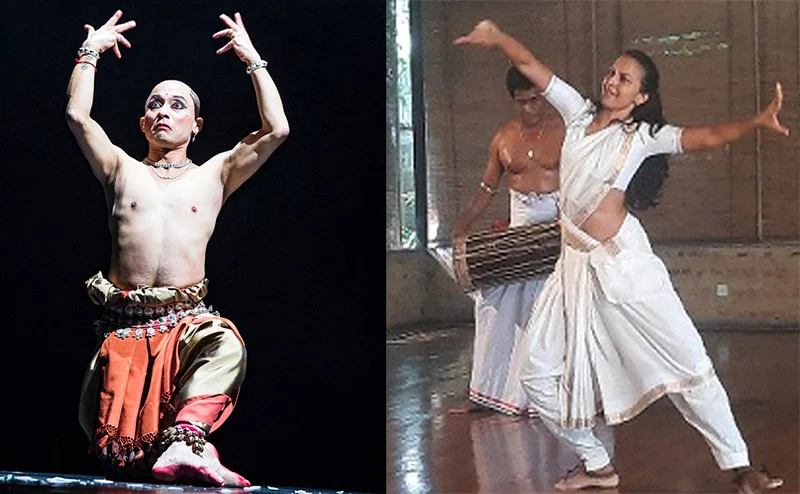
From Chitrasena to Akram Khan:
by Saumya Liyanage
Akram Khan is a world-renowned dancer, choreographer and the founder of Akram Khan Company (AKC) in the UK. He has been an impactful dancer and choreographer who was initially trained as a Kathak dancer during his apprenticeship under various Kathak Gurus in Asia and elsewhere. He and his dance company have created numerous dance productions that surpass the traditional boundaries. Akram Khan is a recipient of top awards including two Laurence Olivier Awards, the Bessie Award (New York Dance and Performance Award), the prestigious ISPA (International Society for the Performing Arts) Distinguished Artist Award, the Fred and Adele Astaire Award, the Herald Archangel Award at the Edinburgh International Festival, the South Bank Sky Arts Award, and ten Critics’ Circle National Dance Awards for his company.
With the initiative of the British Council in Colombo, the Akram Khan Dance Company contacted me a few months ago. The Legacy International Project Manager of the AKC, Varsha Kumar sent me an email informing me of an exciting project the dance company wanted to initiate in Jaffna. It was an upcoming collaboration between Akram Khan Company supported by the British Council Colombo to conduct an intense dance exchange workshop. This initiative facilitated a five-day intensive cultural transmission of Bharatanatyam dance conducted by Mavin Khoo, the artistic associate of the Akram Khan Company with a selected group of youth from Jaffna.
The idea was to continue and sustain the traditional dance forms and explore how they could be sustained and continued further through innovative practices. Mavin Khoo visited Jaffna for the first time to initiate this cultural transmission project with the hope of conducting this intense workshop on Bharatanatyam. Mavin Khoo, trained as a traditional dancer in Bharatanatyam in Malaysia, is a choreographer and the creative collaborator of Akram Khan. Mavin holds an MA in Choreography from Middlesex University and was a faculty member of the Dance Studies Department, School of Performing Arts at the University of Malta in 2014. He has been working as the rehearsal director of the Akram Khan Company and is exploring traditional dance and its contemporary relevance as a mode of human agency and provocation.
It is an ongoing work that the AKC initiated and this collaboration will continue further in future. Here is something interesting about what happened when Khoo, Varsha and their team came to Colombo after finishing the Jaffna Classical Intensive project. The British council director Edward Orlando invited me to a networking lunch in Colombo, where Khoo and Varsha were present. At lunch, I met some of the Sri Lankan dance community representatives. They included versatile dancers such as Upeka Chitrasena, Heshma Wignaraja, and Kapila Palihawadana. We shared our thoughts and ideas about dance and future collaborations during lunch. After this session, Upeka Chitrasena invited us to visit Chitrasena Dance Company. Akram Khan Company focused on helping peripheral dance groups to sustain and continue their traditional dance heritage and encouraged them to expand their possibilities of innovations, and the Chitrasena Dance Company in Colombo is also dedicated to preserving and continuing Sri Lankan traditional dance practices for posterity.
Dance as Ekstasis
- Chitrasena (1921-2005)
- Akram Khan
I am not a dancer, but I have been interested in dance and dance theatre throughout my academic career. Dance and theatre share many elements and it is the body that is central to the dancer and actor’s work. A few days ago, at the Faculty of Medicine, a session was conducted by the Centre for Meditation Research on how movement facilitates happiness and wellbeing. With my research collaborators, Kanchana Malshani and Chamanee Darshika, I demonstrated how movement is central to our understanding of the self and the world. The key question that I posed at the seminar is that movement allows us to understand our body, time and space and allows us to understand how we could connect with other bodies. Movement is the primal element of the body of the animated being.
What fascinates me here is that actor/dancer experiences time and space and the Other, in a different way than we experience the same phenomena on the daily basis. Dance scholar and Philosopher Sheets Maxine-Johnston argues that Man comprises temporality within himself, for he is such an ekstatic being. He is always at a distance of himself, always in flight” (Sheets-Johnston, 2015, pp. 16-17). This statement clearly indicates how the dance and dance experience override the objective time and space. Greek etymology of the word ekstatic means how one emancipates from her/his own self and transcends for the daily reality. In this sense, the moving body of the dancer, as I witnessed at the Chitrasena Dance Company, shows that dancers’ “being” is not in the daily reality when they intensely move their bodies in the space and time with the complex drum ensemble. Hence, I argue that our understanding about time and space is constructed through the physiological and mathematical understanding of time and space. The other is understood in a way that we as selves are constructed and defined through various lingual and cultural discourses. In this sense, the dancer/actor surpasses these constructed boundaries when the body becomes animated through dance and acting.
We sat at the Chitrasena Dance Company in the afternoon of Dec., 14 2024, and Khoo and Varsha were scheduled to leave Colombo a few hours later. An intense and galvanising performance was unveiled at the bare stage of Chitrasena Dance Company with Thaji Dias and the dance ensemble with seven master drum players. One after the other, a series of traditional dance repertoires unfolded before our eyes. Particularly Thaji Dias’ mesmerising and electrifying bodily motility of Kandyan, Low Country and Sabaragamuwa styles blended with intense rigor and precision. It was evident that some of the dance repertoires that Thaji and the lead male dancer performed were somewhat improvisational, bringing key elements of Kandyan dance into an ecstasy of performance. Both dancers seemed to be connected with each other through somatic means, communicating with facial and bodily gestures to trigger certain dance repertoire to perform together. I witnessed that both dancers were kinesthetically and sensorially joined through learned repertoires to perform a new interpretation of Kandyan dance form.
Cultural Transmission
These traditional dance performances triggered several important questions related to the dance body and cultural transmission of somatic knowledge. First, when Heshma, the artistic director and choreographer of Chitrasena Dance Company introduced a particular dance repertoire developed and choreographed by Vajira Chitrasena, she articulated this as a cultural transmission of choreographic knowledge which came through two generations of dancers. This statement triggered several important questions related to dance historiography. When Chitrasena and Vajira choreographed their works, it may have been done through the embodied knowledge that they possessed through what they learnt and mastered from the traditional Gurus. However, Chitrasena and Vijira may have understood that replicating traditional dance and its repertoire would not add any innovation to their dance interventions. My interest was drawn to this phenomenon and the question emerged on how these individual dance artists have distilled the traditional Kandyan dance to modernist choreographic works through adding innovative elements to their newly founded body notations.
Researchers who are working on the intangible cultural heritage mainly focus on how traditional dance and heritage can be transmitted. They are mainly concerned about how these traditions are continued and sustained through contemporary dance ensembles. However, the intangible heritage discourse has least focused on how these dance traditions have been changing through time and how these new elemental changes have been transformed and transmitted to the next generation of dancers. During our encounters with dance choreographer and artistic director of Chitrasena Dance Company, Heshma discussed how they “do” dance. Her articulation of “doing” dance rather than talking about dance explains how they transmit knowledge of somatic elements of dance through bodies. She said, “We rarely talk … we do not use language but we do dance”. One of the challenges posed by these issues is that the corporeal learning and embodied knowledge cannot be objectified in the researcher’s eyes. They are somatically embedded in the dancers’ bodies and are sedimented within their dance repertoires. A meticulous observation, analysis and categorisation will be required for someone to understand and identify how these dance elements have been changed and embedded in the dancer’s body. As I believe, new dance ethnographic research would be useful for researchers to extricate those elemental dance repertoires to understand how contemporary dancers’ bodies embody dance heritage in their somatic memories.
Conclusion
Akram Khan and his creative associate Mavin Khoo explore the possibilities of preserving traditional dance forms while seeking opportunities to revive them through innovative practices. The Chitrasena Dance Company working in the field of traditional Sri Lankan dance ambitiously is in search of a new era of Sri Lankan dance while passing the Chitrasena -Vajira dance heritage to the next generation of dancers and choreographers. Both companies share similar objectives in dance preservation and innovations within the highly contested Global cultural domains. Khan, Khoo, Chitrasena, Vajira, Thaji and other dancers embody a vast knowledge of somatic practices akin to their own dance traditions. Yet, these ekstatic bodies transcend the daily constructed selves, which carry the somatic knowledge of dance that are waiting to be disseminated in the bodies of the next generation of dancers. These areas of dance-ethnography should be further developed to understand the embodied knowledge and the somatic practices infiltrated through the generations of dancers and drummers. New dance-ethnography, dance historiography and new methodologies should be developed and applied to deepen our understanding of dance as an explicit knowledge of human expressions, emotions and ecstasy.
References
Sheets-Johnston, M. (2015). The phenomenology of dance. Philadelphia (Pensilvania, Estados Unidos) Temple University Press.
Company, Akram Khan. n.d. “Our Biographies.” Akram Khan Company. Cog. Accessed 2024. https://www.akramkhancompany.net/about-us/our-biographies/.
Company, Akram Khan. n.d. “Our Biographies.” Akram Khan Company. Cog. Accessed 2024. https://www.akramkhancompany.net/about-us/our-biographies/.
Nürnberger, Marianne. 2014. “Vajira – the First Professional Female Dancer of the Sinhalese Style.” Sri Lanka Journal of Humanities 40 (0): 99. https://doi.org/10.4038/sljh.v40i0.7232.
Raheem, Mirak. 2022. “Vajira: The Pioneering Female Dancer.” South Asian Dance Intersections 1 (1). https://doi.org/10.55370/sadi.v1i1.1475.
–––
Saumya Liyanage is an actor and professor in Drama and Theatre, currently working at the Department of Theatre Ballet and Modern Dance, Faculty of Dance and Drama, University of Visual and Performing Arts, Colombo, Sri Lanka. saumya.l@vpa.ac.lk
The author wishes to thank Himansi Dehigama for her assistance in preparing this article.
Midweek Review
Motherhood Triumphs
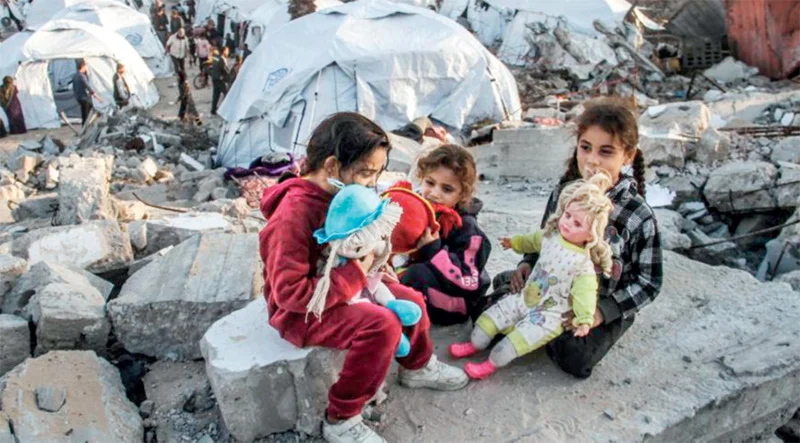
By Lynn Ockersz
Out of war’s destructive wastes,
And piles of mortal remains,
There emerge buds of promise,
Hardly into their teenage years,
That radiate childhood innocence,
And a motherhood of selflessness,
That would give fragile humans,
Their only security guarantee,
In a life rifled with uncertainties.
-

 Opinion6 days ago
Opinion6 days agoDegree is not a title!
-
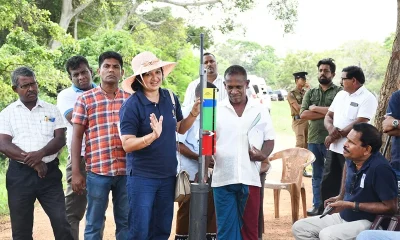
 News5 days ago
News5 days agoInnovative water management techniques revolutionising paddy cultivation in Lanka
-
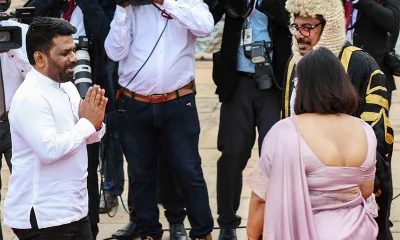
 Features4 days ago
Features4 days agoThe Degree Circus
-

 Editorial6 days ago
Editorial6 days ago‘Compass’ under the microscope
-
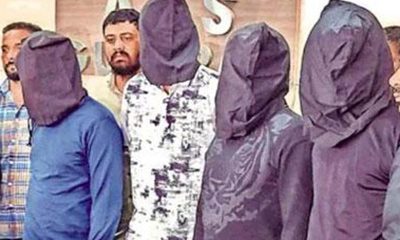
 News6 days ago
News6 days agoArrest of Lankans on terrorism charges in Gujarat: Muslim grouping renews campaign for their release
-
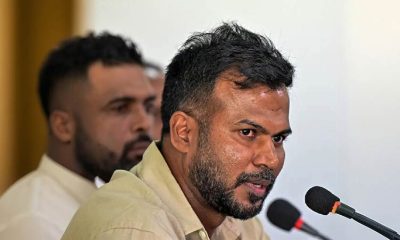
 Sports2 days ago
Sports2 days agoSri Lanka to mend fences with veterans
-

 Opinion4 days ago
Opinion4 days agoHas ‘Compass’ lost direction?
-

 Editorial5 days ago
Editorial5 days agoA supreme irony


